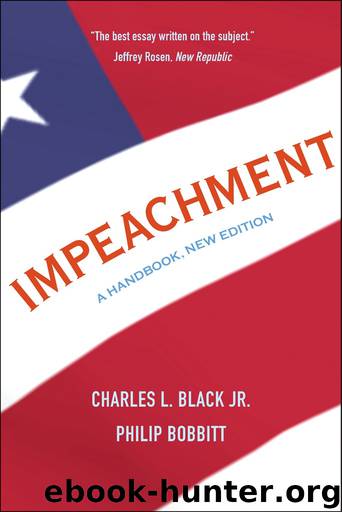Impeachment by Charles L. Jr. Black

Author:Charles L., Jr. Black [Black, Jr., Charles L. Black,]
Language: eng
Format: epub
ISBN: 9780300238266
Publisher: Yale University Press
Published: 1974-01-15T07:00:00+00:00
CHAPTER 7
Seven Fallacies
Though much has changed in the practices of the US government and in the expectations of the public since 1974, much abides. From the very beginning of our life as a republic under a constitution ratified by our people, there have been six fundamental methods taken from English common law by means of which the Constitution has been applied. These six forms of argument—history, text, structure, doctrine, prudence, and ethos—are sometimes called “modalities,” the philosophical term for the ways in which a proposition is determined to be true. In the constitutional law of the Unites States these six modalities determine whether a proposition of constitutional law is deemed to be true—whether the assertion of a particular constitutional principle accurately states the law. Together these six archetypal forms of argument compose the standard model by which judges, lawyers, officials, and citizens determine the law of the Constitution.
Indeed, that is the point of this book: impeachment is a matter of constitutional law and for this reason Charles Black’s analysis remains as potent today as when it was written, despite the changes in American political society. One of these modalities—doctrine, or precedent—is applied according to the rule that the latest in time by the most authoritative source is dispositive. Thus the increased aggressiveness shown by the House in 1999 is now part of our law as to what the House may lawfully deem an impeachable offense. Another of the modalities—prudence, or the calculation of cost and benefits—also applies to a present context that is constantly shifting as the country’s social, political, and economic situation changes. The public’s demand for influence on events, effectuated by polling or social media, for example, and the media’s demand for greater transparency in government, reflected in the deplorable anonymous release of confidential grand jury information, are as much the drivers of this change as they are its manifestations.
Case law and political calculation, however, are not the only forms of legitimate constitutional argument. Thus there are counter pressures to recent developments to be found in the Federalist Papers (history); in Black’s lucid technical mastery of the ways in which the terms of a legal document are construed, like the rule of eiusdem generis (text); in the basic, though always contested, relations between a Congress that may not remove the president merely because a majority of its members have lost confidence in the administration, and the president who may not abuse his powers simply because he is unable to work the machinery of legislation effectively (structure); and in the tradition of the rule of law that is supreme over politics where constitutional rules are to be applied (ethos). These modalities are just as potent as doctrine and prudence, perhaps even more so when we are searching for firmer ground as the earth moves beneath our feet.
Moreover, even recent doctrine by an authoritative tribunal like the US Supreme Court can be wrong because the court’s reasoning is found to be flawed. As a doctrinal matter, the limitation of Bush v.
Download
This site does not store any files on its server. We only index and link to content provided by other sites. Please contact the content providers to delete copyright contents if any and email us, we'll remove relevant links or contents immediately.
The Secret History by Donna Tartt(16611)
The Social Justice Warrior Handbook by Lisa De Pasquale(11486)
Thirteen Reasons Why by Jay Asher(7783)
This Is How You Lose Her by Junot Diaz(5755)
Weapons of Math Destruction by Cathy O'Neil(5032)
Zero to One by Peter Thiel(4818)
The Myth of the Strong Leader by Archie Brown(4786)
Promise Me, Dad by Joe Biden(4441)
Stone's Rules by Roger Stone(4413)
Beartown by Fredrik Backman(4406)
How Democracies Die by Steven Levitsky & Daniel Ziblatt(4393)
The Fire Next Time by James Baldwin(4338)
100 Deadly Skills by Clint Emerson(4072)
A Higher Loyalty: Truth, Lies, and Leadership by James Comey(4028)
Rise and Kill First by Ronen Bergman(4009)
The David Icke Guide to the Global Conspiracy (and how to end it) by David Icke(3876)
The Farm by Tom Rob Smith(3870)
Secrecy World by Jake Bernstein(3774)
The Doomsday Machine by Daniel Ellsberg(3726)
